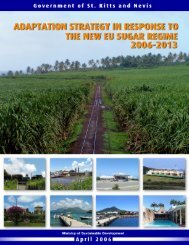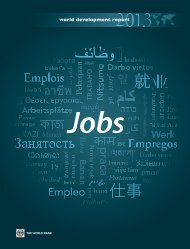Business Removing
Doing Business in 2005 -- Removing Obstacles to Growth
Doing Business in 2005 -- Removing Obstacles to Growth
- No tags were found...
You also want an ePaper? Increase the reach of your titles
YUMPU automatically turns print PDFs into web optimized ePapers that Google loves.
REMOVING OBSTACLES TO GROWTH: AN OVERVIEW 7<br />
Myth #4 Regulation is irrelevant in developing<br />
countries because enforcement is poor<br />
If it were, it would not be associated with so much informality<br />
(figure 1.8). Few businesses comply with all<br />
regulations in poor countries, since it is so prohibitively<br />
costly that entrepreneurs choose to operate in the informal<br />
economy. A large informal sector is bad for the<br />
economy: it creates distortions, reduces tax revenues and<br />
excludes many people from basic protections. If regulation<br />
were simplified, entrepreneurs would find benefits<br />
in moving to the formal sector, such as greater access to<br />
credit and to courts.<br />
FIGURE 1.8<br />
Heavier regulation—more informality<br />
Informal sector share of GDP<br />
Greater<br />
share<br />
Lesser<br />
share<br />
Most difficult<br />
Least difficult<br />
Countries ranked by ease of doing business, quintiles<br />
Source: Doing <strong>Business</strong> database.<br />
What to expect next?<br />
Three other areas of the business environment are being<br />
researched. First, dealing with business licenses. One argument<br />
that government officials give for why business<br />
entry is difficult is that they don’t need to spend many<br />
resources on regulation once the worthy entrants are selected.<br />
Studying business licensing tests this argument—<br />
and the argument fails. The same countries that heavily<br />
regulate entry also have more complex and burdensome<br />
licensing regimes (figure 1.9). The data and analysis will<br />
be released in late 2004 on the Doing <strong>Business</strong> website.<br />
Two new topics will be featured in Doing <strong>Business</strong> in<br />
2006. One is trade logistics. What are the procedures, time<br />
and cost for an exporter to bring goods from the factory<br />
door to the ship, train or truck and across the border?<br />
FIGURE 1.9<br />
Bureaucratic entry, bureaucratic operations<br />
Cost to obtain operational licenses and permits<br />
Higher<br />
Lower<br />
Least expensive<br />
Most expensive<br />
Countries ranked by cost to start a business, quintiles<br />
Source: Doing <strong>Business</strong> database.<br />
What does it take to import a good and bring it to the<br />
store shelf? How to deal with customs, pre-shipment inspections<br />
and technical and quality certification?<br />
The other is corporate taxation—its level, structure<br />
and administration. Tax reform has been hotly debated,<br />
especially in Europe, where several transition economies—Bulgaria,<br />
Poland, Russia and Slovakia—are moving<br />
to or have already adopted flat corporate and personal<br />
tax at rates lower than the ones in other European countries.<br />
Estonia has no tax on corporate earnings if they are<br />
re-invested. Whether lowering taxation spurs enough<br />
new business activity to make up for the loss of budget<br />
revenues is a question that will be addressed next year.<br />
The number of sample countries will continue to expand.<br />
This year, Bhutan and Estonia were included in this<br />
report. Data for Fiji, Kiribati, the Maldives, the Marshall<br />
Islands, Micronesia, Palau, Samoa, the Solomon Islands,<br />
Tonga and Vanuatu are available on the Doing <strong>Business</strong><br />
website. The governments of another dozen countries,<br />
such as Cape Verde and Tajikistan, have requested inclusion<br />
in next year’s sample.<br />
Beyond adding new topics and countries is the challenge<br />
of understanding how reform takes place. Doing<br />
<strong>Business</strong> started by studying what entrepreneurs go<br />
through in starting a business, hiring and firing workers,<br />
enforcing contracts, registering property, getting credit,<br />
protecting investors and closing a business. With time,<br />
the project is building more information on reforms—<br />
what motivates them, how to manage them and what<br />
their impact is. Coming in Doing <strong>Business</strong> in 2006 are<br />
studies of what reformers go through to improve business<br />
conditions.

















